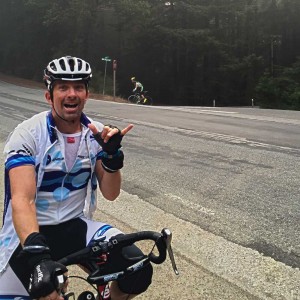
This morning climbing Kings I got the feeling a consistent effort would pay off, and it did. Instead of doing a suicide effort to play with the fast kids on the block (Kevin, George, MarkP, Nigel, Karl & Marcus), I let them ride away before the first hairpin (over the creek crossing) and let them drift slowly out of sight.
Kevin (my son, not the pilot) shouldn’t have been up there with the fast guys, but he tried anyway, and around the 2 mile mark flamed out spectacularly. Spectacularly enough that I was able to catch and pass him, which is quite a rare thing. I briefly thought about hanging back to make sure he was OK, but since it was looking like I had a slightly chance at getting 26-something, and he had a couple others (Kevin the pilot and JR) who were taking it easy and riding just behind him, I kept on going.
I’ve only been up Kings, um, quite literally between 2 & 3 thousand times, so it’s not like I don’t know the various timing points. This was going to be close, very close. I hit the final hairpin (archery range) at 23:40 and it takes predictably 4 minutes from there to the top, if you don’t fall apart. The 2-minute-warning is at the road marker in the clearing, and from the warning sign for the stop at the top, 30 seconds. I ended up losing 10 seconds on that final run, finishing in 26:50 according to the lap timer on my Garmin.
And that’s the thing. The absolute most-accurate timing is when you do it manually, starting at the Tripp Road sign, and stopping where the broken remants of the old road sign are, just a few feet short of the top, on the right-hand side. That, as I said, was 26:50.
But Strava says the Tripp Road/Skyline segment was 26:27 today. Looking closely at that segment, it beings a few seconds after Tripp Road, and ends… well, hard to tell, but obviously it must be a bit shy of the top. That’s the second way to analyze your climb.
The third way is, simply, how you feel about it. Did you leave anything on the table? Were you efficient or were there peaks & valleys? Did you feel like dry-heaving at the top or were you thinking you should have ridden harder and tried to stay up with the others?
And the fourth is how others view your effort. Those you rode up the hill with, those you were behind, and those you were ahead of. Your peer group, sort of. Are they going to be cruel or kind? That too will affect how you feel about your day on Kings.
And check out this interesting new Strava feature, which lets you watch things unfold as you climb, showing your relative position to others. Very cool!






Mike, here’s my clip of the view on west OLH: http://youtu.be/nTrZu-niDP0